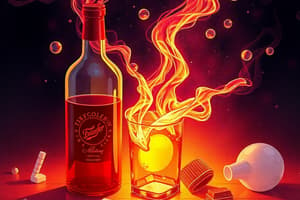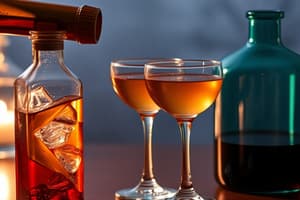Podcast
Questions and Answers
Alcohol is classified as a depressant drug because it:
Alcohol is classified as a depressant drug because it:
- Increases heart rate
- Stimulates brain activity
- Boosts energy levels
- Slows brain and body reactions (correct)
The percentage of alcohol in 80-proof liquor is:
The percentage of alcohol in 80-proof liquor is:
- 60 percent
- 50 percent
- 30 percent
- 40 percent (correct)
Identify three ways that teens who drink put themselves at risk for physical harm.
Identify three ways that teens who drink put themselves at risk for physical harm.
Car wrecks, fights, cancers.
How do peers influence teens' decision whether to drink?
How do peers influence teens' decision whether to drink?
Blood alcohol concentration measures:
Blood alcohol concentration measures:
Which organ breaks down alcohol?
Which organ breaks down alcohol?
How can alcohol's interaction with other drugs be fatal?
How can alcohol's interaction with other drugs be fatal?
Why is blood alcohol concentration a more reliable indicator of intoxication than the number of drinks consumed?
Why is blood alcohol concentration a more reliable indicator of intoxication than the number of drinks consumed?
A condition in which less and less alcohol causes intoxication is called:
A condition in which less and less alcohol causes intoxication is called:
What are the physical and psychological signs of alcohol addiction?
What are the physical and psychological signs of alcohol addiction?
What are some signs that a person may be a problem drinker?
What are some signs that a person may be a problem drinker?
During detoxification, why might an alcoholic need to be in a hospital?
During detoxification, why might an alcoholic need to be in a hospital?
Why do doctors recommend that former alcoholics avoid drinking even one drink?
Why do doctors recommend that former alcoholics avoid drinking even one drink?
The skills you need to say no to alcohol are called:
The skills you need to say no to alcohol are called:
List three reasons why teens should abstain from alcohol.
List three reasons why teens should abstain from alcohol.
What activities do you enjoy that take place in alcohol-free settings?
What activities do you enjoy that take place in alcohol-free settings?
Flashcards are hidden until you start studying
Study Notes
Alcohol Classification and Effects
- Alcohol is a depressant, slowing down brain and body reactions, impacting coordination and judgment.
Alcohol Content
- 80-proof liquor contains 40% alcohol by volume.
Risks for Teens
- Teens who drink face physical harm risks, including car accidents, involvement in fights, and increased cancer risk.
Peer Influence
- Peer pressure significantly affects teens' decisions regarding alcohol consumption, as they seek to fit in and imitate their friends' behaviors.
Blood Alcohol Concentration (BAC)
- Blood alcohol concentration measures the amount of alcohol present in a person's bloodstream, providing a reliable reflection of intoxication levels compared to the number of drinks consumed.
Alcohol Metabolism
- The liver is the organ responsible for breaking down alcohol in the body.
Drug Interactions
- Combining alcohol with other drugs can lead to potentially fatal consequences due to severe bodily reactions.
Alcohol Dependency
- Reverse tolerance occurs when increasing amounts of alcohol are needed to achieve intoxication, indicative of alcohol dependency.
- Signs of alcohol addiction include the body requiring alcohol for normal functioning and using alcohol as a coping mechanism.
Problem Drinking Indicators
- Indicators of a problem drinker include drinking to avoid issues, preference for drinking alone, inability to stop despite attempts, and dishonesty about consumption.
Detoxification Needs
- During detox, severe withdrawal symptoms may necessitate hospitalization due to potential life-threatening complications.
Abstaining from Alcohol
- Former alcoholics are advised to avoid alcohol completely, as addiction can resurface easily.
- Refusal skills are essential for resisting alcohol pressure among peers.
Reasons for Teen Abstinence
- Key reasons for teens to abstain include unpredictably addictive nature, impairment of reasoning and decision-making, and risk of making poor choices.
- Strategies to say no include taking time to consider, providing logical reasons for abstaining, explaining possible consequences of drinking, asserting refusal firmly, suggesting alternative activities, and walking away from pressure situations.
Alcohol-Free Activities
- Engaging in enjoyable activities in alcohol-free environments can promote healthier lifestyle choices.
Studying That Suits You
Use AI to generate personalized quizzes and flashcards to suit your learning preferences.




